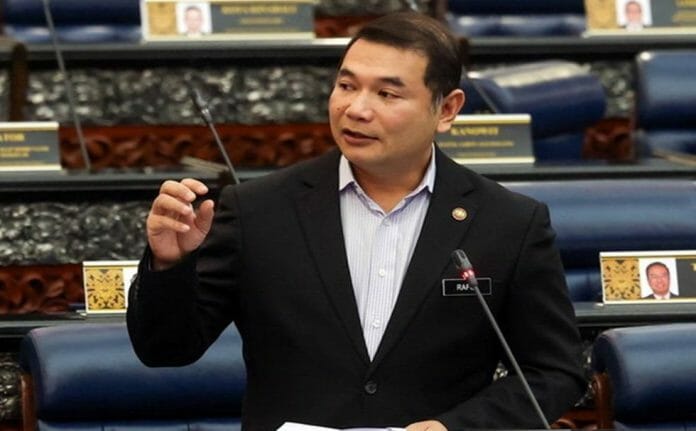Budget 2024 has proposed a new approach to measure the level of participation and control of the Malaysian economy to ensure it becomes more meaningful.
This was the stand made by Minister of Economy Rafizi Ramli who has returned to work, after undergoing a heart stent placement procedure recently. The Pandan MP was present in the Dewan Rakyat today (Oct 30) to deliver his ministry’s winding-up speech on the Supply Bill 2024.
To questions raised by 77 MPs in Parliament on Budget 2024, he said, the national budget forms a strong base towards achieving significant milestones in the areas of Malaysia’s economic position and the focus sectors to drive economic growth; economic restructuring to overcome structural problems such as retargeting of subsidies and Progressive Wage Policy; poverty eradication and social protection; regional development, including the issue of development allocations and the Bumiputra economic agenda.
Rafizi explained that external developments are at risk of triggering a global economic slowdown for the period 2023 to 2025 and is expected affect the growth of the country. The International Monetary Fund (IMF) in October 2023 projected the world economy to grow slowly by 3.0% in 2023 and lower in 2024 by 2.9%. World trade is projected to grow by 0.9% in 2023, but is expected to recover to 3.1% in 2024.
China’s economy is projected to grow by 5.0% in 2023 and is expected to moderate to 4.2% in 2024. Based on China’s economic performance, any changes that occur in the country will have an impact on Malaysia’s economic development. This is because China has been Malaysia’s largest trading partner since 2009.
“Even so, despite facing these challenges that are beyond our control, the Government is committed to ensuring that economic growth can be achieved as targeted and is optimistic that the measures taken will offset the effects of the global economic slowdown. In 2024, the national economy is expected to record growth of between 4.0% and 5.0%, supported by a recovering external environment and expectations of better domestic demand and labor market conditions.”
This expected growth rate in 2024 is in line with several international agencies such as the International Monetary Fund and the World Bank which estimate Malaysia’s GDP to grow by 4.3% in 2024. The government is confident that this projection can be achieved based on several key economic indicators, including preliminary indicators such as global semiconductor sales (WSTS semiconductor sales) which shows the technology cycle will increase again and has the potential to benefit the country’s E&E exports.
This indicator is expected to drive an increase in the manufacturing and trade sectors.
The government also prioritised re-stimulating the country’s economic growth in order to expand its size and return the economy to the right track. Focus will be given to intensify potential sectors such as revitalising tourism activities and speeding up construction activities through the implementation of infrastructure projects as well as strategies and initiatives under the Government’s main policy.
As for the medium-term strategy, the economy will be restructured to accelerate the transition towards becoming a high-income country in line with MADANI Economy’s aspirations to make Malaysia a leader in the Asian economy.
The Government in the Half-Term Review of the Twelfth Malaysia Plan (12th MP) will implement 17 Big Shifts, including HGHV energy transition, technology and digital, high-value E&E, agriculture and agro-based and rare earths, he reterated.
In addition, there is a Big Shift to empower SMEs and social enterprises, strengthen the public transport network and ensure the availability of future talent. Focus will also be given to attract more quality investment in technology-based industries to stimulate sector growth and create high-income jobs.
Therefore, in an effort to ensure that the country’s economic growth target of 5.0% to 5.5% per year in the final period of the Twelfth Malaysia Plan (2023-2025) can be achieved, the focus will be on increasing domestic demand.
In order to increase private sector spending, the Government is targeting private investment at current prices growing at 8.9% or the equivalent of RM300 billion per year in the period 2023-2025.
This average private investment target will be supported by the implementation of new projects and existing across key sectors of the economy.
In addition, strategies and initiatives under key Government policies that have been launched such as Budget 2024, KSP 12th RM, Energy Transition Roadmap (NETR), New Industrial Master Plan 2030 (NIMP 2030) are also expected to support this target.
The next focus is to complete the roadmap of the other HGHV sectors in the next 12 months. So far, the Government has launched NETR and NIMP 2030, as a sectoral blueprint that translates policy to specific measures to make the energy transition sector and the industrial sector the country’s new growth engine.
The government is now focusing on developing the same sectoral blueprint for the other three HGHV sectors, namely the digital and technology economy (including boosting the development of start-ups and the entry of global technology companies into Malaysia), modern agriculture and the economy based on rare earth resources (REE). This sectorial blueprint will detail more
targets, initiatives, pilot projects, enablers and incentives will be jointly developed by the ministries and agencies involved in these HGHV sectors.
The government is confident that through strategies and initiatives that are being and will be implemented, the GDP growth target in the 12th RMK KSP will be achieved. This is to enable the goal of a high-income, inclusive and sustainable country to be achieved, in line with the aspirations of the MADANI Economy, he said.









